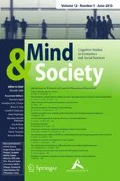Abstract
In recent decades “inference to the best explanation” has become a fashionable mode of reasoning. It is, however, highly problematic and flawed in ways that the article expounds. Instead, so it is argued, a process of inference from (not to) the best systematization of the relevant determinable facts is a far more plausible and promising procedure.
Similar content being viewed by others
Notes
The idea was originated by C. S. Peirce was launched on its career in this particular terminological guise in Harman (1965), and subsequently developed in his book Harman (1973). Its rationale is given fuller articulation by Harman (1966); and also in Harman (1968). The theory was criticized in Lehrer (1974). Its philosophy of science applications were discussed in Thagard (1978). A general survey of the terrain is Lipton (1991). See also Stadler (2004).
For criticisms of ITTBE in the mode of “inference to the likeliest cause” see Lipton, op. cit., Chap 4. See also Cartwright (1983).
Simplicity is the focus of an enormous literature in recent epistemology and philosophy of science and involves a hornet’s nest of issues, if only because of its multitude of components. One theory can be simpler than another is that is easier to learn, easier to state, easier to apply, easier to work with (computational facility), and so onwards.
On these issues see Rescher (1979).
As far as I know, this approach was first formulated by Max Black as a (mis-?-) interpretation of Popperianism: “Those who agree [with Popper] would rewrite putatively inductive inferences to make them appear explicitly as [optimal] hypothetical explanations of given facts.” (Art. “Induction” in The Encyclopedia of Philosophy, ed. by P. Edwards, Vol. 8, New York, 1967, p. 173.)
References
Cartwright N (1983) How the laws of physics lie. Oxford University Press, Oxford, pp 89–91
Harman G (1965) The inference to the best explanation. Philos Rev 74:88–95
Harman G (1966) The inference to the best explanation. Philos Rev 63:241–247
Harman G (1968) Knowledge, inference, and explanation. Am Philos Q 5:164–173
Harman G (1973) Thought. Princeton University Press, Princeton, p 1973
Lehrer K (1974) Knowledge. Clarendon Press, Oxford
Lipton P (1991) Inference to the best explanation. Routledge, London; revised ed., Routledge, London 2004
Rescher N (1979) Cognitive systematization. Blackwell, Oxford
Stadler F (ed) (2004) Induction and deduction in the sciences. Kluwer, Dordrecht
Thagard P (1978) The best explanation: criteria for theory choice. J Philos 75:76–92
Author information
Authors and Affiliations
Corresponding author
Rights and permissions
About this article
Cite this article
Rescher, N. Inference from the best systematization. Mind Soc 15, 147–154 (2016). https://doi.org/10.1007/s11299-015-0186-8
Received:
Accepted:
Published:
Issue Date:
DOI: https://doi.org/10.1007/s11299-015-0186-8




